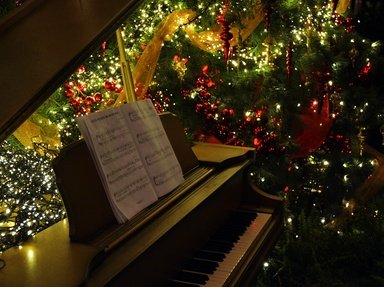Quiz Answer Key and Fun Facts
1. The traditional English Christmas carol, 'God Rest Ye Merry Gentlemen', as originally written, had a comma in the title. Where did that punctuation mark appear?
2. 'Hark! The Herald Angels Sing' was written in 1739 by Charles Wesley, brother of John Wesley, founder of the Methodist movement. Complete the missing words from the third verse of the ever-popular carol:
"Mild He lays His glory by
Born that man no more may die
Born to raise the sons of earth
Born to give them ________________."
3. A popular form of medieval carol combined phrases in liturgical language (Latin or occasionally Greek) with words in the vernacular, skillfully interweaving them into a coherent flow. One of these,'In Dulci Jubilo', is still well-known in various English versions. Which of the following phrases is the nearest translation of 'In dulci jubilo'? (Think of dulcet tones, think of jubilation!)
4. 'Good King Wenceslas' is a misnomer of a title. Why is the title incorrect?
5. 'Silent Night', without question, is one of the most popular Christmas carols in the English-speaking world. However, in which language was the carol originally written?
6. What Christmas carol is sung to a tune supposedly written by King Henry VIII?
7. Of what Christmas carol is Martin Luther often incorrectly identified as being the author?
8. What Christmas carol was written by Isaac Watts, the father of hymnody? (Hint: the carol was written in 1719, but remains extremely popular today.)
9. What Christmas hymn contains the refrain, "Come and worship, come and worship / Worship Christ, the new-born King"?
10. What Christmas carol contains no less than twenty-one 'rum pum pum pums' in its lyrics?
Source: Author
Cowrofl
This quiz was reviewed by FunTrivia editor
agony before going online.
Any errors found in FunTrivia content are routinely corrected through our feedback system.
